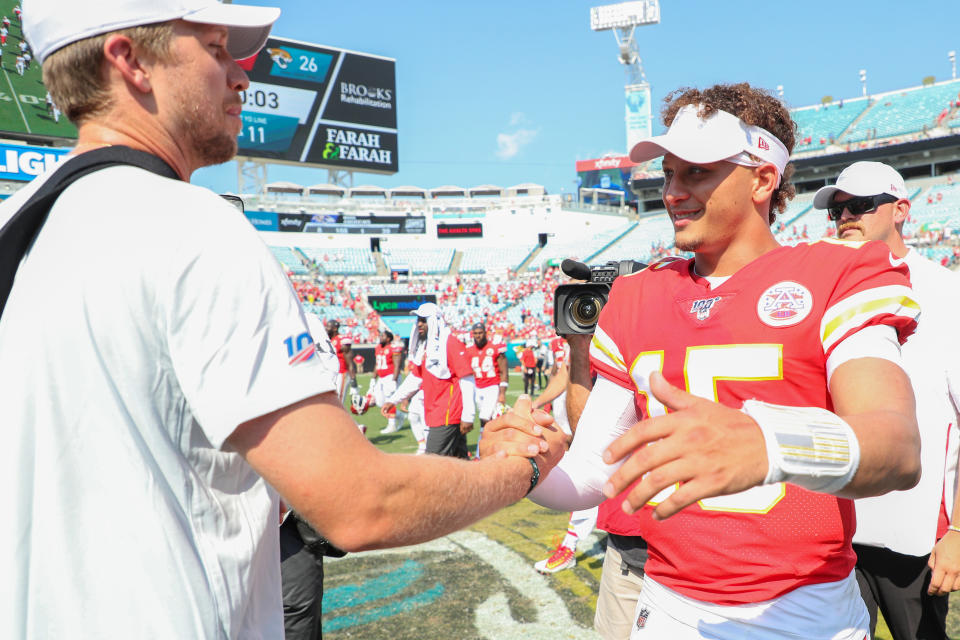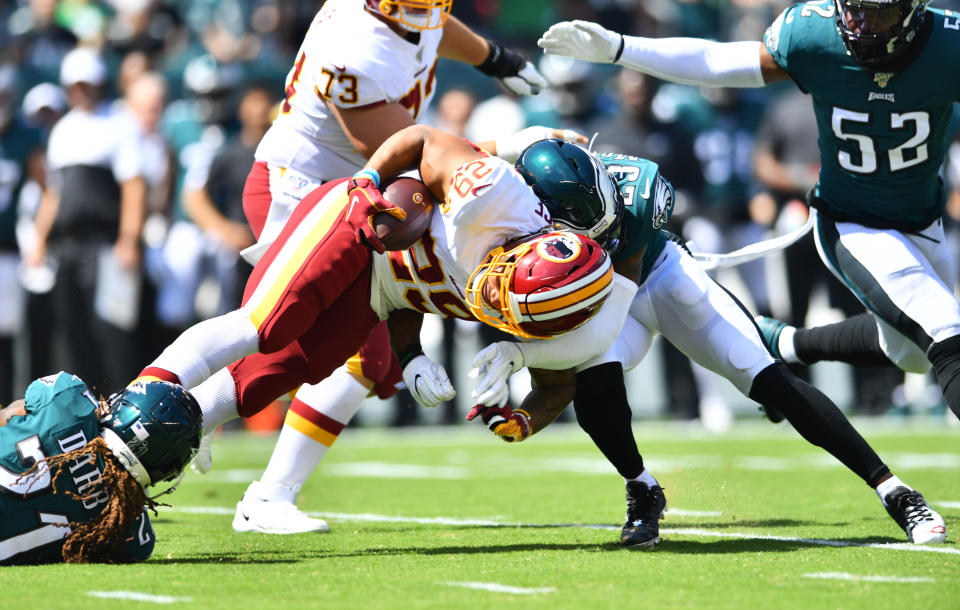Week 1 carnage proves point of NFL players: Expanding regular season is a terrible idea
In August, when Philadelphia Eagles safety Malcolm Jenkins was mulling over the NFL’s sales pitch to players about the cascading financial benefits of expanding the regular season to 18 games, he reiterated a warning from players that the league and its team owners didn’t seem to want to hear.
“They keep having a conversation about money and we keep having a conversation about health and safety and longevity,” Jenkins told Yahoo Sports during the Eagles’ training camp. “We’re having a totally different conversation. That’s a problem. Every additional game we play, that’s a risk for players.
“Just throwing money at players when we’re the ones looking at the health consequences, it’s got to be a better conversation than that. I really don’t think anybody is interested in playing extra regular-season games considering what our bodies are already going through now.”
[Watch live NFL games on the Yahoo Sports app, download it here.]
That’s the verbal message to the league from NFL players. One particularly brutal week into the NFL season, they have a physical message to back it up.

Jacksonville Jaguars quarterback Nick Foles? A broken collarbone.
Kansas City Chiefs quarterback and reigning league MVP Patrick Mahomes? Sprained ankle. His star wideout Tyreek Hill has a significant shoulder injury.
New York Jets linebacker C.J. Mosley – one of the biggest free-agent signings of the offseason – has a groin injury.
Cleveland Browns quarterback Baker Mayfield has a wrist issue.
Indianapolis Colts wideout Devin Funchess has a broken collarbone. New England Patriots starting offensive tackle Marcus Cannon has a shoulder injury. Philadelphia Eagles key defensive tackle Malik Jackson suffered a “significant” foot injury. The Washington Redskins ran into knee issues for both running back Derrius Guice and defensive tackle Jonathan Allen.
Nobody drove the point home like the Pittsburgh Steelers, who had multiple starters leave the Sunday night game with injuries, including wideout JuJu Smith-Schuster, linebacker TJ Watt, cornerback Joe Haden and center Maurkice Pouncey.
The carnage went on and on, to the point that we can’t even get to the full list. But it’s out there. And it’s looooong.
Football is a violent sport. It comes with the territory. But this week is what players are talking about when they rip the idea of an increased number of games in the regular season. This week is why the player’s union continually shoots down proposals from team owners that would seek to increase the most dangerous part of the season.
It’s not as simple as eliminating some preseason games that feature a spare few important players. It’s that a 16-game regular season already appears to be at a limit that is barely tolerable to the bodies of the players who slug it out. If you don’t believe that, go ask Andrew Luck or Rob Gronkowski, who both surrendered multiple years of top-level earnings because their pain thresholds were being breached.

For fans who will eventually care about the state of labor negotiations, this is the right time to pay attention. A key conversation is playing out now in front of your eyes. Football is already a staggering game of attrition. And players keep saying it over and over: That aspect gets worse as more games are piled onto them in a single season because it stretches their rest and recovery to an even thinner margin. Not to mention an important point Jenkins made in August:
“If we play two more games this season, that’s two more games you’re taking away further down the line in a player’s career,” Jenkins said. “Our bodies only have so many games in them. That’s not changing.”
That might not sound like a big deal but it becomes one when you’re in the midst of a bad season and suddenly you’re adding two more games of risk in an endeavor that suddenly only impacts your draft positioning. Or the flip side: You’re a team like the Patriots, riding through a never-ending Super Bowl window that already puts multiple playoff games onto the docket every year. Imagine where Tom Brady might be now if he’d played an extra two games in the 17 seasons he has been a healthy starter. That’s another two full seasons of games. It means Brady would likely be in retirement now, rather than pushing New England toward a seventh Super Bowl ring.
That’s something to keep in mind as fans hear more about the $1 billion to $2 billion that another one or two regular-season games would be worth to players. Well ... some players, anyway.
“If you just look at this locker room and say a billion dollars is going to be generated with one or two extra games, who’s that money going to go to?” Jenkins asked.
“It’s not like teams are going to take that money and divide it up equally amongst the entire locker room. That money is going to go to the top 1 percent of your team. The guys at the very top [of the pay scale] will be the ones who see that money. You’ll end up having 99 percent of the players taking on health risks while a few dozen guys actually reap the financial rewards of it. And we’re already dealing with the middle [of the pay scale in the NFL] disappearing as it is.”
Depending how long this next CBA negotiation drags on, these will be some fundamental points of argument from players against an expanded regular season. And if the start of 2019 is any indication, the carnage on the field is going to back them up more significantly than ever.
More from Yahoo Sports:

